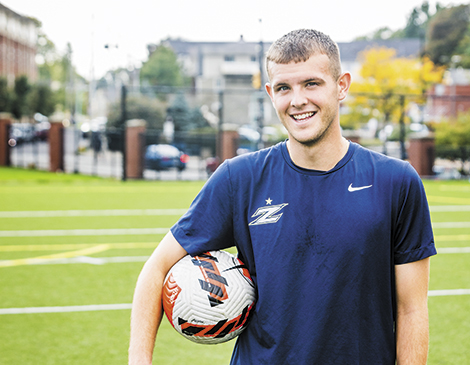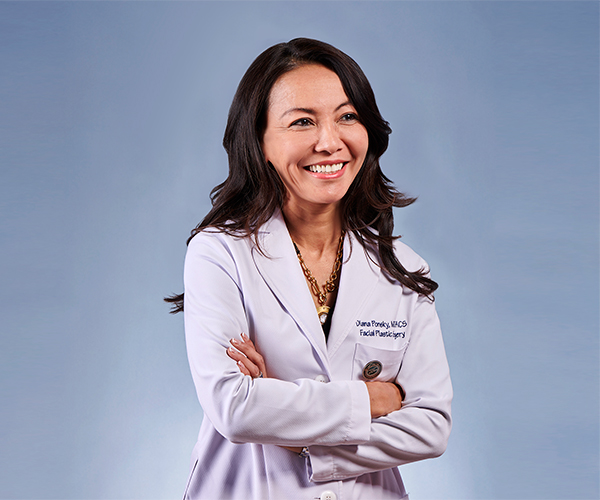For Paul Jones, soccer is so much more than a sport.
“It’s one of the biggest parts of my life,” says Jones.
The 20-year-old South Carolina native grew up with cleats on his feet, ultimately choosing soccer over other sports when he was 11 due to the camaraderie of the team environment he experienced when on the field. He relishes his chosen position of center back, defending the area right in front of the goal, because he says that position gives him time to think and use his understanding of the game to support his team.
“As a center back, I can see the whole field and use my brain to help my teammates as opposed to only using my athletic ability,” says Jones.
His goal of becoming a professional soccer player took a huge leap forward when coaches from the University of Akron saw him play at a soccer camp in Chapel Hill during his junior year of high school. He then received an invitation to visit campus.
Akron’s soccer team had recently made it to the finals of a national tournament, and Jones desperately wanted to be a part of a team of that caliber. When the university made Jones an offer to play, he eagerly accepted and enrolled for the fall 2020 semester.
“Committing to Akron was a dream come true,” says Jones.
But where other students spend the summer before freshman year buying dorm supplies in delightful anticipation of their college experience, Jones was barely able to get out of bed for almost four weeks, laid low by COVID-19.
“Luckily I wasn’t hospitalized, but I was pretty sick for two weeks and couldn’t smell or taste for around a month,” says Jones.
When he arrived on campus last fall, he thought he was fully recovered. But when the weather started turning colder, he started experiencing shortness of breath. He thought maybe his fitness wasn’t in peak shape, and he rededicated himself to a rigorous gym regimen. He knew something more serious was going on when a half-mile walk from his dorm to the dining hall completely winded him.
“I was on a phone call with my mom, and I had to hang up and sit down because I could barely breathe,” says Jones. “I remember thinking, Something’s not right. This has never happened to me before. This isn’t normal.”
A visit to his school’s athletic trainer led to an appointment with a cardiologist who referred him to Summa Health System’s Post-COVID Clinic. As his initial tests with the cardiologist came back clear, the theory that emerged was that Jones might be a “long hauler,” an individual who experiences persistent symptoms or even a new diagnosis that emerges long after first being diagnosed with COVID-19.
“A large percentage of people recover fully from COVID without significant consequences, but around 30% are left with at least fatigue or other symptoms that can be present for months after the initial infection,” says Dr. Brian Bauman, medical director of pulmonary services for Summa Health System.
The Post-COVID Clinic’s method to patient care is distinctly multi-disciplinary, employing a variety of specialists from a range of departments from cardiology to neurology to behavioral health, all to create an individualized plan for the patient in front of them. Bauman explains that the team approach is a necessity given the dearth of information in the medical community on COVID-19.
“The biggest problem with COVID is that nobody knows a lot about it,” says Bauman. “The advantage of having a clinic with a number of different specialties working together is that we can educate each other and then educate the patient on the specific effects of COVID that the individual is encountering.”
For example, their physical therapy program is completely individualized for each patient, with different approaches based on whether the patient is experiencing fatigue, weakness, shortness of breath or difficulties concentrating, the symptom known as “COVID fog.” The team of specialists then gets together to develop a specific plan tailored to that specific patient.
“This multi-disciplinary discussion among the providers allows us to see how the different manifestations of the disease can be treated and how they interact with each other, clinical information that is just not widely available yet,” says Bauman.
For Jones, Summa Health System’s approach started in February with lung function testing during which he would breathe into a tube to measure his pulmonary capacity. His shortness of breath was immediately apparent to the team of specialists, with his lungs operating markedly less optimally than you would expect for a 20-year-old athlete in peak physical shape. The results were consistent with a diagnosis of asthma. The doctors explained to him that the asthma was a result of COVID-19 and that the cold weather was exacerbating his symptoms.
“Growing up in South Carolina, where I have only seen snow a few times in my life, my body just wasn’t used to the cold, and so the sudden asthma was even more intense,” says Jones.
The doctors from the Post-COVID Clinic started him on a regimen of a prescription medication for asthma and an albuterol inhaler, and he experienced positive results within a month.
“The great part about asthma is that it is very treatable,” says Bauman. “Paul started responding immediately to the treatments, and so we were able to get him quickly back onto the soccer field without limitations.”
With his body on the mend, Jones’ spirits began to lift. The more time he spent not being able to play soccer, the more he felt disconnected from his sense of purpose.
“I couldn’t play, I couldn’t go to practice, and I wasn’t doing what I came here to do,” says Jones. “And there was no explanation for any of that.”
Bauman highlights that Jones’ feelings of uncertainty represent a common theme among patients and it’s one of the reasons the clinic’s team-centered and individualized approach is so important. For patients who have not been able to get the medical answers to their ailments from their primary care doctors, experiencing symptoms without explanation can be mentally debilitating.
“We work together as specialists to pinpoint what is wrong, which is a huge relief for patients, even if we can’t fix everything right away,” says Bauman. “They want to know that something real is going on.”
With a diagnosis in hand and a treatment plan in practice, all eyes are on the future for Jones. He is majoring in sports business so that he can stay involved in athletics long after he graduates The University of Akron, either in the front office of a sports franchise or on a coaching staff.
But first, he is laser-focused on getting himself back onto the soccer field, which means getting back to full health. He is appreciative of the care he received at the Post-COVID Clinic and is feeling nothing but hope for his cleated future.
“This is the game that I love and I can’t wait to return the support on the field to all the people that have supported me off the field,” says Jones.




